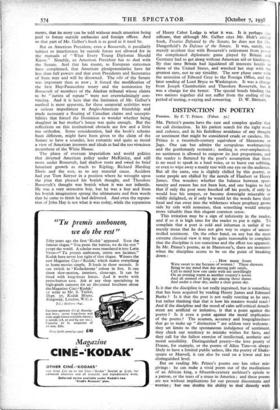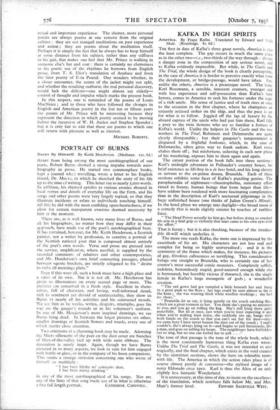DISTINCTION IN POETRY
Poems. By F. T. Prince. (Faber. 5s.)
MR. PangcE's poems have the rare and complex quality that we call distinction. In his patient search for the right word
and .cadence, and in his fastidious avoidance of any thought or sentiment that might be considered crude or careless, Mr. Prince is a twentieth-century equivalent of Shenstone or Jago. One can but admire the scrupulous workmanship and the gentlemanly restraint ; nothing is over-emphasised, no sentiment is allowed to outgrow its just proportions, and the reader is flattered by the poet's assumption that there is no need to speak in a loud voice, or to burst out sobbing, or even to wipe away a manly tear with one eye on the audience.
But all the same, one is slightly chilled by this poetry, as some people are chilled by the novels of Flaubert or Henry James. One wonders whether the balance between spon- taneity and reason has not been lost, and one begins to feel that if only the poet were knocked off his perch, if only 'he would lose his temper, or become downright miserable or wildly delighted, or if only he would let the words have their head and run away into the wilderness where prophecy grows side by side with nonsense, then something would emerge more valuable than this elegant common sense.
This irritation may be a sign of inferiority in the reader, and if so it is high time for the reader to put it right. To complain that a poet is cold and inhuman is unfair if we merely mean that he does not give way to orgies of uncon- trolled sentiment. On the other hand, on any but the most extreme classical view it may be quite reasonable to complain.
that the discipline is too conscious and the effort too apparent. In Mr. Prince's poems, as in Shenstone's, there are moments when the discipline seems to be on the point of breaking down : . . . How many hours
Were sweet to me because of women ! These showers Bring to my mind that day among pale sands,
Call to mind how one came with me unwillingly On an evening warm as another country's noons And all seemed of-long ago among those dunes
And under a clear sky, under a clear green sky.
Is it that the discipline is not really ingrained, but is something that his been acquired by reading Henry James and Edmund Burke ? Is it that the poet is not really reacting as he says, but rather thinking that that is how his masters would react ? And if the discipline and the mood of calm self-critical detach- ment are artificial or imitative, is that a point against the poetry ? Is it even a point against the moral implication of the poems ? The acumen, accuracy and longsightedness that go to make up " distinction " are seldom very welcome : they set limits to the spontaneous indulgence of sentiment, they check our tendency to mistake wishes for facts, and they call for the fullest exercise of intellectual, aesthetic and moral sensibility. Distinguished poetry—the love poetry of Donne, for example, or the poems of Allen Tate—is always likely to have a limited public unless, like the poetry of Shake- speare or Marvell, it can also be read on a- lower and less distinguished level.
But on reading Mr. Prince's poems ope has other mis- givings : he can make a vivid poem out of the meditations of an African king, a fifteenth-century architect's epistle to a patron, or the tears of a muse in America ; and these poems are not without implications for our present discontents and 'worries ; but one doubm his ability to deal directly with
actual and important experience. The shorter, more personal poems are always poems at one remove from the original subject : they are not tranquil meditations on past experience and action ; they are poems about the meditation itself. Perhaps it is simply the fact that he always has to keep himself at some distance from his subject, rather than any stiffness in his gait, that makes one feel that Mr. Prince is walking in someone else's hat and coat : there is certainly no clumsiness in his poetic use of the rhythms he borrows from English prose, from T. S. Eliot's translation of Anabase and from the later poetry of Ezra Pound. One wonders whether, in a closer encounter, the seams of the jacket might not split, and whether the resulting outburst, the real personal discovery, would lack the . delicate—one might almost say elderly— control of thought and impulse which marks the present book. In this respect, one is reminded of the poems of Louis MacNeice ; and to those who have followed the changes in English and American poetry in the last ten or fifteen years the poems of Mr. Prince will be interesting because they represent the direction in which poetry seemed to be moving before the incursion of W. H. Auden and Stephen Spender; but it is only fair to add that these are poems to which one will return with pleasure as well as interest.
MICHAEL ROBERTS.















































 Previous page
Previous page